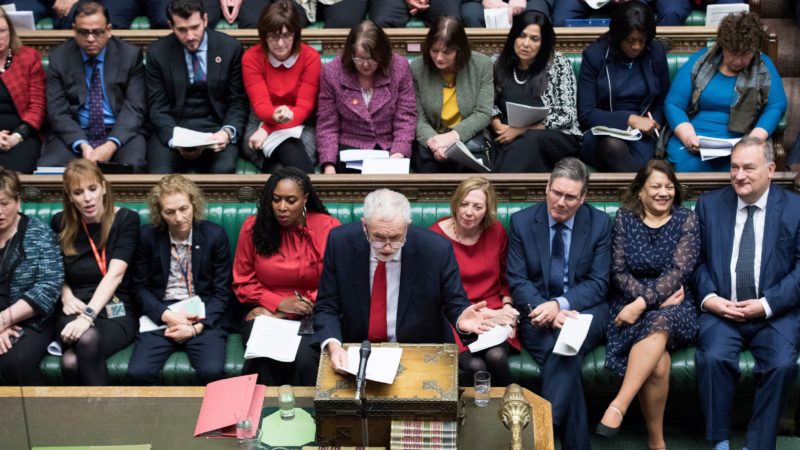
Depending on which pollster you believe, the Tory lead over Labour is between 0% and 12%. That’s the difference between a hung parliament and a big Conservative majority. The polls vary wildly, but they agree only on one thing: the Labour Party will not win the next general election outright.
For strategic reasons, the party leadership has been a Brexit chameleon, shifting its colours to suit its surroundings. In the 2017 election, it was a pro-Brexit party in Leave-voting towns like Wigan, and a pro-EU party in Remain-voting Kensington.
This held together an electoral coalition that has formed the bedrock of Labour support in recent times. It is an alliance between its post-industrial heartlands, the big cities and the university towns. It is a coalition increasingly at odds over cultural issues such as immigration, but united when it comes to economic issues like tax and spending.
In its chameleon-like guise, the leadership was able to hold the fractious Labour vote together in 2017. It will not be so lucky at the next election. While the party has backed a ‘people’s vote’, the Lib Dems have a clearer anti-Brexit stance. Leave voters in its heartlands will not be satisfied with the party’s promise to negotiate a “Labour deal” with the EU. With the party and its electorate deeply divided over the Brexit, how can Labour hope to win the next election?
The government may be hoping its new proposals for the Irish border, which were drawn up to replace the backstop, will satisfy parliament and the EU. The Labour leadership has already said it will vote down any new arrangement, if such an offer does get put to the Commons, leaving Jeremy Corbyn’s party with two options: bringing down the government in a confidence vote, or forcing it (potentially through the courts) to sign a three-month extension to the Brexit deadline.
The problem with both of these options is that they are likely to bring about a pre-Brexit election. It is one that Labour would be unwise to fight. The party is lagging behind in the polls, caught between the much clearer positions of the other parties. A recent YouGov poll put the party in third place behind the Lib Dems, on 21%.
A pre-Brexit election would also play into the hands of the government. It’s clear that the Tory leadership has been waiting for such a scenario ever since Boris Johnson was elected leader in the summer. It has repeatedly tried to goad opposition parties into backing an election. Its electoral strategy is no secret either: the Tories will try to polarise the electorate along Leave/ Remain lines, hoping to gnaw its way into Labour heartlands, making the gains necessary to secure an overall majority.
But the Labour Party has an alternative to a pre-Brexit election: a Brexit deal. In the Spring, after Theresa May’s withdrawal agreement was defeated a third time, her government entered into negotiations with Labour. Labour ultimately abandoned the talks, but not before it secured major concessions from the government: protections to workers’ rights and the environment; a parliamentary lock to give MPs greater say in future negotiations; and a Commons vote on whether to put the ‘deal’ to a confirmatory public vote.
There might still be a majority in parliament to pass such an exit deal. Last month, a group of Labour MPs led by Stephen Kinnock and Caroline Flint formed a cross-party alliance to pursue a Brexit compromise. The group rejects no deal and, at least for now, a second referendum. Instead it seeks to bring back the withdrawal agreement bill that would have been produced following cross-party talks had Theresa May not been ousted.
If the government’s proposals for the Irish border are acceptable to the EU, Labour should back them in principle. If they are not, they should look to bring back Theresa May’s ‘deal’ as the basis for compromise. In both outcomes, the government will need Labour votes to get any arrangement across the line.
This will present a perfect opportunity for Labour. It should agree to back the ‘deal’, or at least whip its MPs to abstain, subject to some crucial amendments. Labour should insist on the inclusion of the compromises it previously negotiated with the government. It could even insist on a confirmatory public vote as a way to bring reluctant MPs onside.
If Labour can lead parliament to a compromise on Brexit, it will be put at an advantage in the election that will inevitably follow. A deal on Labour terms would nullify the threat the party faces both from its Leave and Remain flanks. It will have honoured the referendum result, while allowing a future public vote to take place.
The Labour Party would also be able to contrast its willingness to broker a compromise on Brexit with the extremism of the Tory European Research Group, and with the wilful failure of the government’s negotiating strategy. As the party of pragmatism, it will be well-placed in the eyes of voters to conduct the next stage of negotiations with the EU.
Passing a Brexit deal would also help to realign Labour’s electoral coalition. In 2017 the Labour manifesto’s radical economic policy helped increase its vote share – and it could do so again. The party could present the electorate with a programme of national renewal, seeking to bring the country together after three years of Brexit division, and nine years of damaging austerity.
The Labour Party should seek a compromise on Brexit. A pre-Brexit election would allow the Tories to blame Labour for their own mishandling of negotiations with the EU. A post-Brexit election would provide Labour with the perfect opportunity to reunite the country.




More from LabourList
Nudification apps facilitate digital sexual assault – and they should be banned
Diane Abbott suspended from Labour after defending racism comments
Labour campaign groups join forces to call for reinstatement of MPs